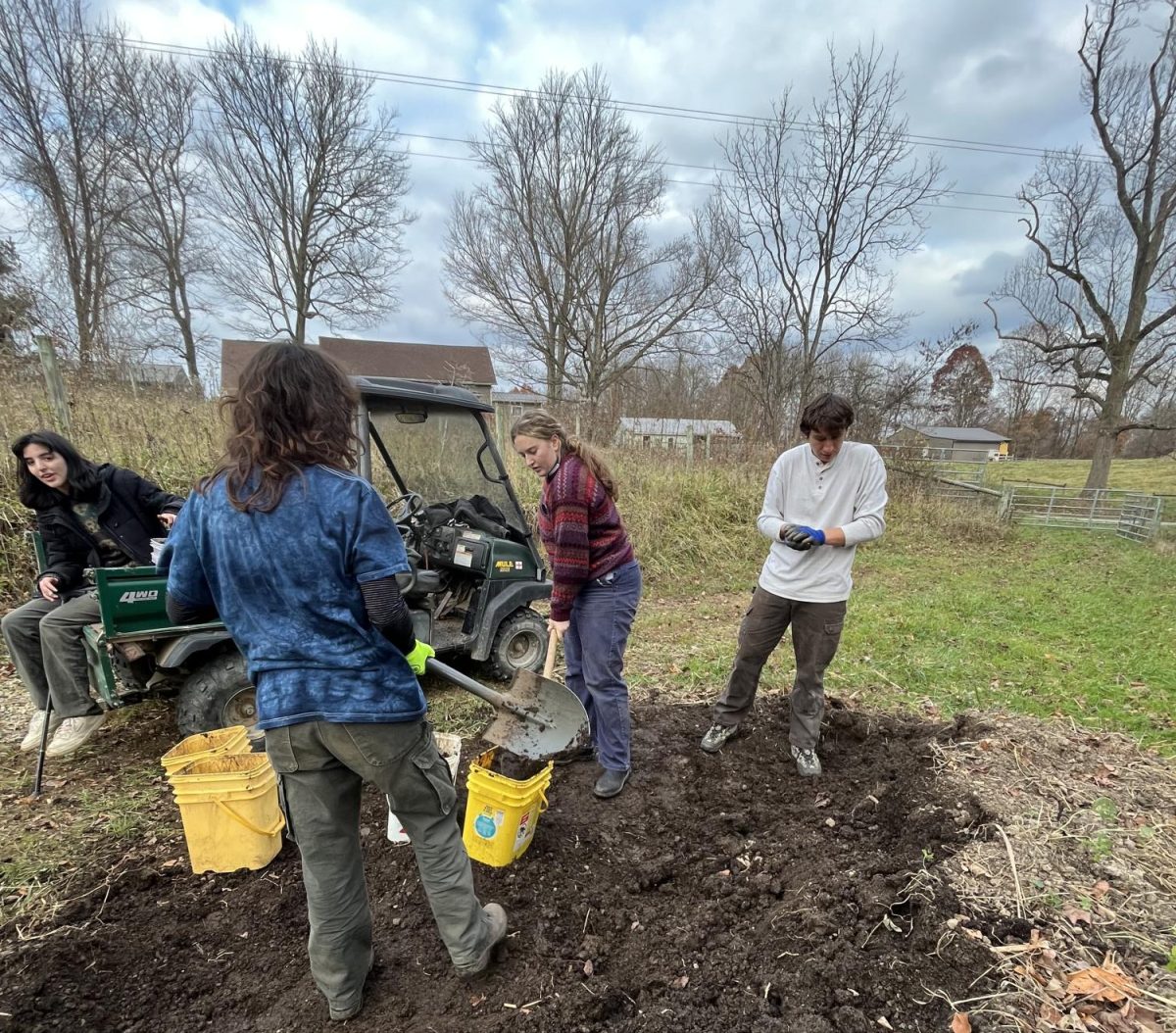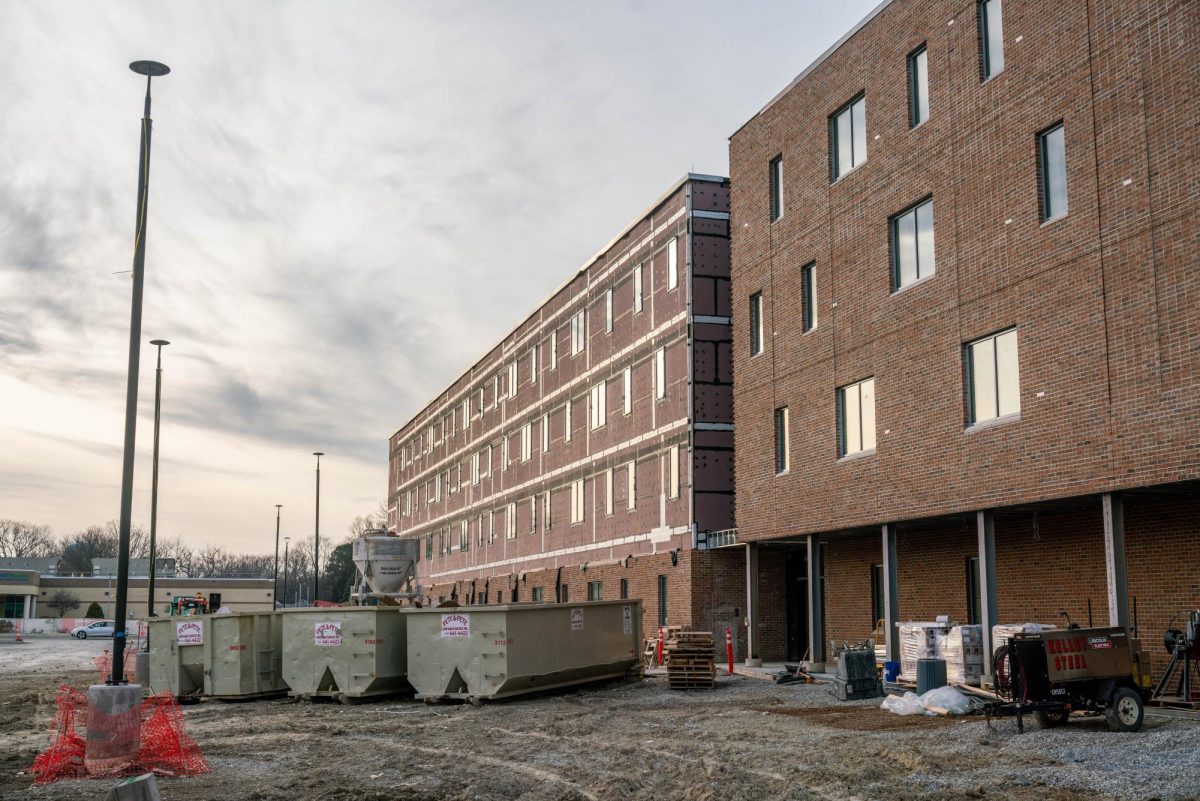From Nov. 10–12, 11 Oberlin students visited Blue Rock Station, a sustainability center in Philo, to learn about sustainable farming and clean energy.
Since 2004, 34,000 people have come to Blue Rock Station for various events. Annie and Jay Warmke, who run Blue Rock Station, teach classes in animal husbandry, sustainable architecture, solar installation, and agriculture, while also farming the land.
In the coming years, Annie Warmke plans for Blue Rock to move toward food forests, a sustainable method of crop cultivation utilized by Indigenous people in the Americas. Food forests were recently affirmed by the U.S. Department of Agriculture as a method of sustainable growth as the U.S. moves away from monoculture row planting.
“We’re focusing now on the food forest idea because that will enable the farmer that comes after me to make a living,” Warmke said.
In 2022, Sionainn Rudek, OC ’23, began bringing Oberlin students to Blue Rock after visiting the sustainability center independently. Second-year College student Molly Davis reached out to Rudek to organize the trip again this year. Davis obtained funding from the Oberlin Green EDGE Fund, then worked with Warmke to set an agenda and organize the trip.
The trip was also sponsored by Barefoot Dialogue, a branch of the Multifaith Chaplaincy at Oberlin.
“What we know from land-relating in Barefoot is that the mediating and healing power of land is profoundly and uniquely able to contribute balance and meaning in the lives of students intensely focused on academic study,” Multifaith Chaplain David Dorsey said.
Blue Rock Station was created in 1993 when Warmke learned about a type of recycled building called an Earthship. Earthships were invented by architect Michael Reynolds as buildings made of recycled materials — tires rammed with clay serve as the walls — designed to be as self-sufficient as possible. Earthships heat and cool themselves, treat their own wastewater, and are powered by solar and wind energy.
Warmke saw the construction of a building like this as the origin point for her vision of a sustainable farming haven and education center that she’d been imagining for decades.
“When I met my husband, I would say, ‘If you want to get together, you have to understand that, at some point, I’m going to go back to being a farmer,’” Warmke said.
She and her husband bought the land in 1993. Then she heard a radio story about the Earthships.
“I was listening to community radio in Tampa, Florida,” she said. “They had [Reynolds] talking about building buildings out of trash. I said to my precious little granddaughter, who was sound asleep, ‘You and Mama are gonna do that.’”
The Warmkes began planting fruit trees that year. They bought plans from Reynolds, and construction of the Earthship began in 1996. It was complete enough to live in by 2005.
Davis and Annie Warmke decided the focus of the trip would be on translating the things the students learn, feel, and experience at Blue Rock into tangible projects back at Oberlin.
“We were really focused on being able to move that energy into something more productive,” Davis said. “Last year, it was like, we [had] all of these ideas and then we really didn’t know what to do, so a lot of this year was, ‘How do we get that energy to be made into something different?’”
At the center, students shoveled compost, gardened, and played with goats.
“[Students said] it was nice feeling genuinely physically tired because of work that they’d done and not because they were up until two in the morning finishing a paper — that they were shoveling compost, walking back and forth, and doing actual jobs,” Davis said. “It was a really nice time to take a step back and intentionally live with sustainability.”
College first-year Marlena Hall said the trip helped her feel a sense of community with the other visitors.
“The most impactful thing for me was getting to know a group of people who have similar interests to me,” Hall said. “I think I found some people who are really in line with my beliefs and had some special life stories they’d like to share.”
The students brought back a variety of ideas for projects to bring what they’d learned into Oberlin life. Students plan to bring more attention to the Johnson House Garden, Oberlin’s community garden project run by the Resource Conservation Team. Some students also intend to organize a spring fundraiser with music and sustainability workshops that they’ve tentatively named “Springfest.”
Woven in with education and participation in tangible sustainability projects like food forests, clean energy, and recycled architecture was discussion of a concept called “active hope.”
Warmke described active hope as a combination of gratitude for what you have and recognizing the things you are grieving.
“It’s not, ‘Oh, I’m hoping that things will get better,’” Warmke said. “It’s about actively doing something to move forward and looking at things a bit differently. I ask myself, ‘What is it I can do within myself, with the gratitude and the experiences I have, to move forward in life?’”
Rudek recalled what he’d learned about active hope from his time at Blue Rock Station.
“We have to hold on to some sense of hope in order to solve the problems of our time creatively and collectively,” Rudek said.“It is here that the importance of localization, of mutual aid, of community has been reiterated as divine, as earthly, as complex, as necessary.”
For students interested in getting involved with sustainability at Blue Rock Station, Davis recommends they look into the Oberlin branch of the Sunrise Movement, participate in plant cultivation at Johnson House Garden, and keep an eye out for the Resource Conservation Team, which runs the Free Store, Food Rescue, and Big Swap programs. Both Davis and Warmke hope for and plan on further collaboration between Oberlin and Blue Rock Station in the near future.
According to Warmke, the most important components to sustainability are gratitude, hope, and action.
“The world is coming to an end as we know it and maybe it already has!” Warmke said. “And thank God, because we’ve screwed up everything. Now we have a chance to put a lot of things in place of these holes that’ve been created by the big screw-ups — to change from being this hedonist culture into something that cares about everything on this planet.”









